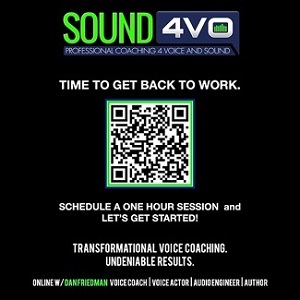|
INCOME/FEES How To Prevent Clients From Taking Control Of Your Time And Fees January 14, 2015  By Gary Terzza By Gary TerzzaVoice Actor & Coach (UK) How would you handle this dilemma? A student of mine was a bit stuck. She had just completed a voice over job and for all intents and purposes it had been signed off. Then a few days later, the client asked her to add an extra paragraph - not a huge amount admittedly, but she would have to fire up the studio again and try and remember how she had delivered the lines in the first place. Getting an extra piece of script to match the original in tone, pace and recording quality requires skill and judgement. I suggested she ask for a small supplementary fee to reflect the additional work involved, which I didn't feel was unreasonable. After all, this was not a retake or correction; this was at the client's request. Tentatively she agreed and then ... the bombshell landed. CLIENT WANTS IT FOR FREE The client sent back a stinging email saying he found the request 'unprofessional.' For goodness sake, he opined, it was only a few lines and he would have expected her to do this for free as part of the original quote. Quite rightly, my student was hurt by the comment and, to be honest, I think she was a little angry with me, too. Who can blame her? She was in the early stages of her voice over career and here was her coach dispensing duff advice. She was worried this incident would tarnish her with a bad reputation. I couldn't blame her. I wondered whether I had misjudged the situation, scuppering her chances of future work with this client. MISTAKE #1 ... Not wanting to leave bad feeling between us, I asked her to give me some more background about the job. What she said surprised me. The client had approached her directly through a well-known pay to play site. He liked her voice and was offering a modest fee for 2,000 words. It was on the low side, but not too bad, she thought. However when the script arrived she was alarmed to see that the word count was actually 4,000 words - double the number specified. Not wanting to upset the client, she decided to go ahead without mentioning the extra work involved. In my opinion this was a mistake and on learning this information, I felt my advice had been vindicated. So what did she do? She said she ate humble pie and recorded the additional paragraph for free. Personally, I'm not convinced that was the correct response. HOW TO DEAL WITH THIS ... What we can we learn from the incident? The above scenario is not uncommon, and voice over artists come across situations like this all the time. You can't stop them arising, but you can learn to deal with them effectively and retain your professional integrity in the process. For me, the biggest mistake my student made was right at the very beginning - she didn't flag up the fact the job was not what the client had quoted. The word count was twice what she had been expecting. That greatly increases the workload. Of course it is feasible the client simply miscalculated and wasn't intentionally trying to get a bigger bang for his buck, or he may have just been unaware that words are our business and that we can't price a job accurately without knowing how many we are going to have to read. To him, there may not be a huge difference between 2,000 and 4,000. Let's be generous and assume this was the case. Had my student mentioned this from the outset she could have, quite reasonably, negotiated a higher fee. SET TERMS AND CONDITIONS There is another omission: she didn't include any terms and conditions in her initial quote. I know voice actors are not mortgage companies, but you need to set out your terms clearly from the start so clients don't receive any nasty surprises. You can't charge for retakes where it was your error, but you can stipulate that additional words, not in the original job spec, will be charged for. If the client does not agree they can always question this before you begin work. YOU TAKE CONTROL There was a third mistake, too. My student didn't take control of the situation. I know we need to be respectful of clients, but an honest relationship is what is needed, not a lopsided contract where you might be pushed about. She was suddenly at a loss when the client challenged her revised fee. Explain why you are charging more and do it with confidence and pride. You are a professional, offering a high quality service and treat your clients with respect and expect this to be reciprocated. Oh, and one final thought - the lowest payers make the worst clients. By the way, what would you have done? --------------------- ABOUT GARY Gary Terzza is a UK voice over coach based in London. He is also a long established voice over artist with a client list that includes Channel 4, BBC, ITV, Pepsi-Cola, Symantec, BAE Systems and Hitachi. Web: www.vomasterclass.com Blog: www.vomasterclass.blogspot.co.uk |
|
|
For essential voice-over business strategies
On Michael Langsner's Voice-Over Roadmap Podcast
With Sean Daeley and Paul Stefano - check it out!
Email alerts to new VoiceOverXtra articles
As of the NEW website launch, 03/22/2012










I've been in Voiceovers for about three years now and of course I've been down this road many times with my first jobs. But as business has started to grow and better paying customers have come along the way, I have also gained in self-esteem and in pride for my work.
When I get an inquiry from a new customer I usually send them my fees, which include fees for subsequent pickups and corrections. Once I get the script, I check it and if something does not correspond to the briefing, I contact the customer and inform him that this will take longer, ergo cost him more. If he agrees, I'll record it.
Unfortunately, the worst paying customers are the most complicated, therefore I allow myself to turn jobs down when my gut tells me to. If they come back and agree to pay my fees, all the better!
So, yeah totally agree to Dan and Mike! Saludos from Switzerland.
There is indeed a great generic contract available that you can copy/paste and alter to your needs - plus much advice about contracts and negotiating fees, in a book published by VoiceOverXtra called "Voice Over Legal." Check out this website, where the book is available as an eBook or paperback:
www.VoiceOverLegal.com.
Over time, I started to learn some important do's and don'ts. Making your requirements known up front is one of the first things to do. Like you said, Gary, not pointing out that the job was now double than originally thought was mistake #1. No wonder the client was surprised when she was asking for an additional fee when he added the paragraph.
I got my start on P2P sites as well, and still dabble there from time to time, but working with one of the best agencies in the country keeps me from encountering problems like this.
Your student is obviously talented, or she wouldn't be working. She'll learn as time goes on. Have her check out my episode on VO Buzz Weekly episode 135, 136 & 137. Lots of good advice.
Oh! And the low ball clients ARE ALWAYS THE MOST DIFFICULT! You and Dan could not be more correct! Props to Dan for EWABS!!!
If I charge $1,500 for a 2K word industrial, and someone offers me $1,200 for a similar job, the second client is now the worse client? I really don't understand exactly what you are saying.
Perhaps you are referring to a specific dollar amount that puts someone into the class of "lowest" paying client?
For example, someone who is paying a ridiculously low fee for a project, say $100 bucks for a 2,000 word project.
If that's the case, yes, then blame the voice artist, rather than pick on the client. You can't have a "client" unless you accepted the job for the fee offered.
Have you ever noticed how some audition notices asking for a particular skill, like imitating Shwartzenegger, are always lowballs? The lowest payers are always the most demanding. It's usually because they don't know what they're asking for and have no idea it takes a professional to provide what they think they want.
You have three choices here: Blow off that audition, which is a great saver of your time, audition and lower your self-esteem and career expectations, or, audition, get the job and educate the client. Nicely.
If they say "no way!" save your time and politely bow out. Give it 10 minutes or an hour (when they go through the auditions again and realize you're the guy they wanted for a reason) and your inbox will usually ring with a counter from them or with what you want.
It's actually uncanny how often that happens. Feel good about yourself that you rose above other candidates. Don't let them take you down by lowballing you. And yes, when you have this initial relationship of mistrust, get it all in writing.
Firstly if I had quoted for a 2k worded piece, that's what the quote would be for. So for 4k of words then another quote would have to be given. And as you have mentioned, a written quote with your T & C's is a must, as the client is paying, and there has to be a clear understanding.
I've always found a personal call - whether it be on Skype or landline to the client - is far more productive than an impersonal email. Far too many people leave the personal touch out of transactions these days, and you just can't put money on the intimate approach to build a relationship with your client.This I've found is the best way for repeat business.
Also, "above and beyond," work done should be highlighted when presenting your end product. This increases the perceived value of your product. Some of us are lucky to have a bit of experience in sales, which can stop any awkwardness or problems before they happen. The client is always correct - but often misinformed!
Regards,
Spike